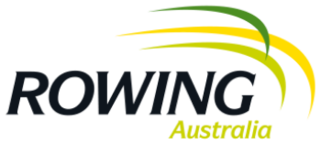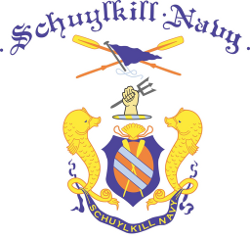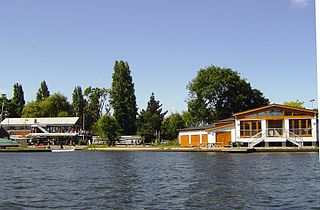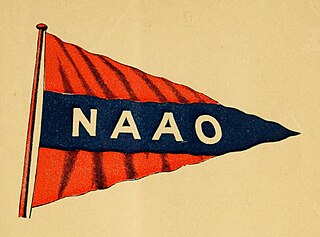Related Research Articles

Rowing, sometimes called crew in the United States, is the sport of racing boats using oars. It differs from paddling sports in that rowing oars are attached to the boat using oarlocks, while paddles are not connected to the boat. Rowing is divided into two disciplines: sculling and sweep rowing. In sculling, each rower holds two oars—one in each hand, while in sweep rowing each rower holds one oar with both hands. There are several boat classes in which athletes may compete, ranging from single sculls, occupied by one person, to shells with eight rowers and a coxswain, called eights. There are a wide variety of course types and formats of racing, but most elite and championship level racing is conducted on calm water courses 2 kilometres (1.2 mi) long with several lanes marked using buoys.

Henley Royal Regatta is a rowing event held annually on the River Thames by the town of Henley-on-Thames, England. It was established on 26 March 1839. It differs from the three other regattas rowed over approximately the same course, Henley Women's Regatta, Henley Masters Regatta, and Henley Town and Visitors' Regatta, each of which is an entirely separate event.

The Colombo Rowing Club is the premier boat club in Sri Lanka having been founded in 1864. Its clubhouse and boat house are located on the edge of the northern Beira Lake, at Sir Chittapalam A. Gardiner Mawatha, in Colombo.

British Rowing, formerly the Amateur Rowing Association (ARA), is the national governing body for the sport of rowing. It is responsible for the training and selection of individual rowers and crews representing Great Britain and England, and for participation in and the development of rowing in England. Scottish Rowing and Welsh Rowing oversee governance in their respective countries, organise their own teams for the Home International Regatta and input to the GB team organisation.

The United States Rowing Association, commonly known as USRowing, is the national governing body for the sport of Rowing in the United States. It serves to promote the sport on all levels of competition, including the selection and training of those who represent the US at international level.

Rowing Australia (RA) is the governing body for the sport of rowing in Australia.

John Brendan Kelly Sr., known as Jack Kelly, was a triple Olympic champion, the first in the sport of rowing. The Philadelphia-based Kelly also was a multimillionaire in the bricklaying and construction industry. He was the father of actress Grace Kelly, Princess of Monaco, and of John B. Kelly Jr., an accomplished rower who served as president of the U.S. Olympic Committee.

The Schuylkill Navy is an association of amateur rowing clubs of Philadelphia. Founded in 1858, it is the oldest amateur athletic governing body in the United States. The member clubs are all on the Schuylkill River where it flows through Fairmount Park in Philadelphia, mostly on the historic Boathouse Row.

Weybridge Rowing Club, founded in 1880, is a rowing club by the Thames in England, on the Surrey bank. The club organises head races, notably the Weybridge Silver Sculls which has had Olympian winners and co-organises a May/June regatta. It consists of a wide range of members: juniors, novices, seniors, masters (veterans) – these include many past and present champions.
The Fuller's Head of the River Fours (HOR4s) is a processional rowing race held annually on the Tideway of the River Thames in London on the 4+1⁄4-mile (6.8 km) Championship Course from Mortlake to Putney.
The Amateur Athletic Association of England or AAA is the oldest national governing body for athletics in the world, having been established on 24 April 1880. Historically it effectively oversaw athletics throughout Britain and Ireland. Its role changed to support regional athletic clubs within England alone. This role was effectively taken over by England Athletics in 2005 and the Amateur Athletic Association of England was absorbed into that organisation. It is now concerned with the development of young athletes and has taken on the role of safeguarding the history of the sport and still awards trophies to elite athletes.

Welsh Rowing is the governing body for the sport of rowing in Wales. It is responsible for promoting the sport in Wales, choosing crews to send to the Home Countries International Regatta and the Commonwealth Rowing Championships as well as progressing talented Welsh rowers along relevant pathways into the Great Britain trials and squads. It has 21 affiliated clubs, including schools and universities.

Skiffing refers to the sporting and leisure activity of rowing a Thames skiff. The skiff is a traditional hand built clinker-built wooden craft of a design which has been seen on the River Thames and other waterways in England and other countries since the 19th century. Sculling is the act of propelling the boat with a pair of oars, as opposed to rowing which requires both hands on a single oar.
The Rowing Association of American Colleges the first collegiate athletic organization in the United States, was a body governing college rowing. Upon organization by the captains of the leading crews of the day, they devised a primary rule of eligibility: that only undergraduate students should be eligible to represent their college in the regatta. To this day, despite numerous amendments and additions, this rule remains the very foundation of the NCAA rules of eligibility.
The Skiff Racing Association (SRA) is the governing body in the United Kingdom for the sport of skiff racing. The SRA is affiliated to British Rowing. The objectives of the SRA are

Walbrook Rowing Club, colloquially sometimes named Teddington Rowing Club, is a rowing club, on the River Thames in England on the Middlesex bank 800 metres above Teddington Lock next to Trowlock Island, Teddington. It is the lowest club on the weir-controlled Thames and is the organising club for Teddington Head of the River Race held in November for all classes of racing shells.

The Thames Tradesmen's Rowing Club is a rowing club on the Tideway in West London, United Kingdom at Chiswick Boathouse, 100 metres north-west of Barnes Railway & Footbridge – beyond which is Barnes Bridge railway station. Other footpaths link to Old Chiswick, Chiswick High Road and Strand-on-the-Green.

The National Association of Amateur Oarsmen, organized in 1872, was the first national governing body of the sport of rowing in the United States, and the first American sports organization to publish a definition of "amateur". Before the NAAO, regattas across the country used different definitions of amateur, making it impossible to hold a national amateur championship regatta. The NAAO's first national championship regatta was held in 1873 on the Schuykill River in Philadelphia. Beginning in 1916, the Julius H. Barnes Points Trophy was awarded to the club scoring the most points over the course of the championship regatta.

Rowing Ireland, formerly the Irish Amateur Rowing Union, is the governing body of rowing for Ireland. It is a cross-border organisation administering the sport in both the Republic of Ireland and Northern Ireland.
References
- ^ London Metropolitan Archives: National Amateur Rowing Association A/NAR
- ^ The Times, 12 June 1937
- ^ The Times, 27 April 1954
- Cleaver H, "A history of rowing", 1957